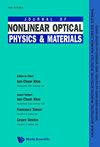P3HT vs Spiro-OMeTAD as a hole transport layer for halide perovskite indoor photovoltaics and self-powering of motion sensors
IF 2.3
4区 物理与天体物理
Q2 OPTICS
引用次数: 1
Abstract
Recent years have witnessed the emergence of indoor photovoltaic (PV) devices with the rapid development of the Internet of things technology field. Among the candidates for indoor PVs, halide perovskites are attracting enormous attention due to their outstanding optoelectronic properties suitable for indoor light harvesting. Here we investigated the indoor PV properties of CH3NH3PbI3-based devices using Spiro-OMeTAD and P3HT as the hole transport layers. The Spiro-OMeTAD-based devices show a consistently higher power conversion efficiency under indoor illumination and 1 sun, with the champion devices showing a power conversion efficiency of 21.0% and 30.1% for the forward and reverse scan under 1000 lux warm white LED illumination. Fewer trap states and higher carrier lifetime were revealed for Spiro-OMeTAD based devices compared to P3HT. The best-performed Spiro-OMeTAD-based devices are used to self-power a wearable motion sensor, which could detect human motion in real-time, to create a primary sensor system with independent power management. By attaching the Spiro-OMeTAD indoor PV device to the strain sensor, the sensor exhibits an accurate and sensitive response with finger bending movements with good repeatability and negligible degradation of mechanical stability, which indicates the success of sensor powering with the indoor PV device.P3HT vs Spiro-OMeTAD作为卤化物钙钛矿室内光伏和运动传感器自供电的空穴传输层
近年来,随着物联网技术领域的飞速发展,室内光伏设备应运而生。在室内pv的候选材料中,卤化物钙钛矿因其适合室内光采集的优异光电性能而备受关注。本文研究了以spro - ometad和P3HT作为空穴传输层的ch3nh3pbi3基器件的室内PV特性。基于spiro - ometad的器件在室内照明和1个太阳下的功率转换效率始终较高,冠军器件在1000 lux暖白光LED照明下的正向和反向扫描的功率转换效率分别为21.0%和30.1%。与P3HT相比,Spiro-OMeTAD基器件的陷阱态更少,载流子寿命更高。性能最好的基于spiro - ometad的设备用于自供电可穿戴运动传感器,该传感器可以实时检测人体运动,从而创建具有独立电源管理的主传感器系统。通过将Spiro-OMeTAD室内PV器件连接到应变传感器上,传感器具有准确灵敏的响应,手指弯曲运动具有良好的可重复性,机械稳定性的下降可以忽略,这表明室内PV器件为传感器供电成功。
本文章由计算机程序翻译,如有差异,请以英文原文为准。
求助全文
约1分钟内获得全文
求助全文
来源期刊
CiteScore
3.00
自引率
48.10%
发文量
53
审稿时长
3 months
期刊介绍:
This journal is devoted to the rapidly advancing research and development in the field of nonlinear interactions of light with matter. Topics of interest include, but are not limited to, nonlinear optical materials, metamaterials and plasmonics, nano-photonic structures, stimulated scatterings, harmonic generations, wave mixing, real time holography, guided waves and solitons, bistabilities, instabilities and nonlinear dynamics, and their applications in laser and coherent lightwave amplification, guiding, switching, modulation, communication and information processing. Original papers, comprehensive reviews and rapid communications reporting original theories and observations are sought for in these and related areas. This journal will also publish proceedings of important international meetings and workshops. It is intended for graduate students, scientists and researchers in academic, industrial and government research institutions.

 求助内容:
求助内容: 应助结果提醒方式:
应助结果提醒方式:


